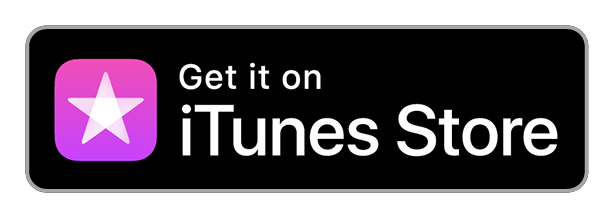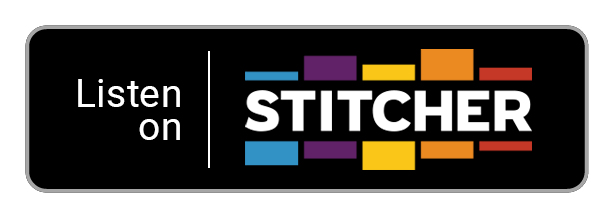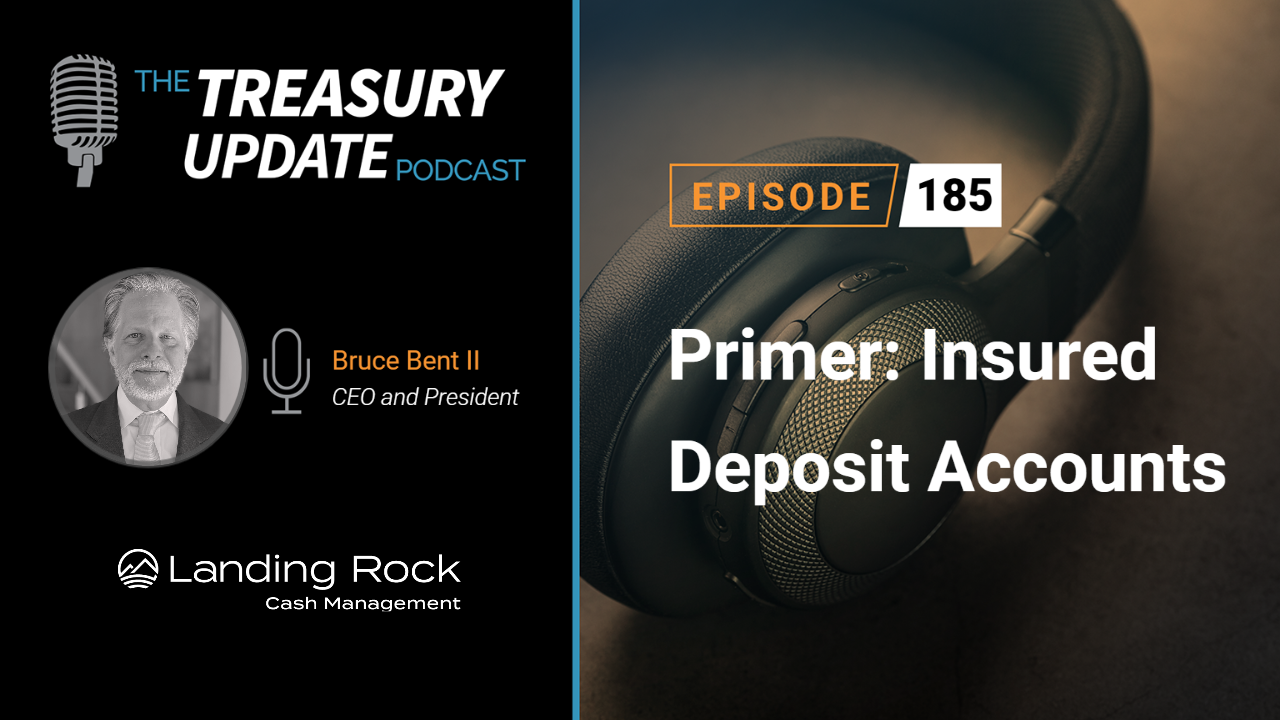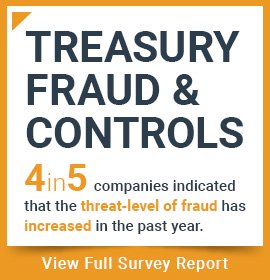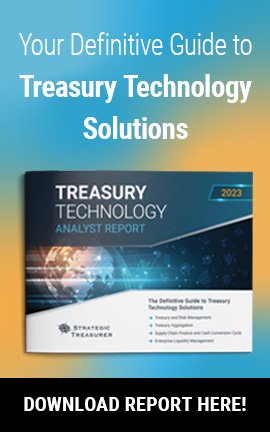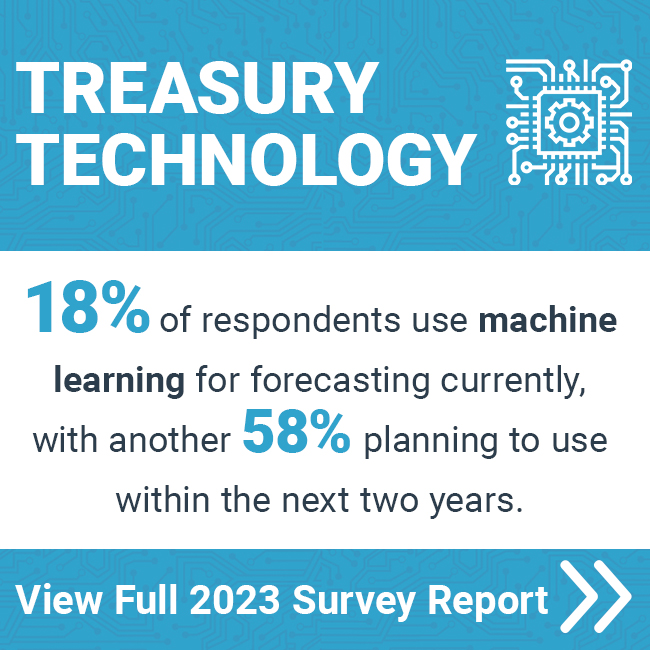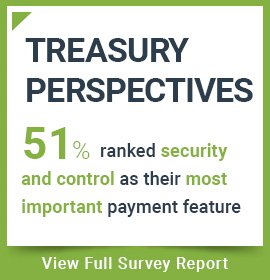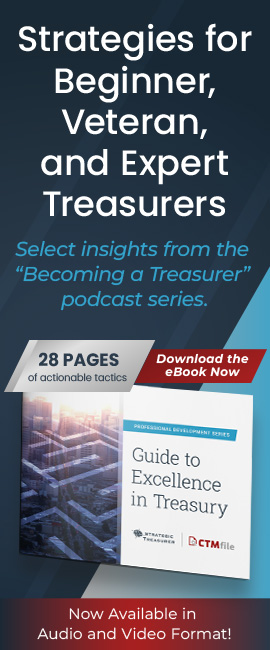
Episode 186
Insured Deposit Accounts: Interest Rate Changes and Security
Host:
Craig Jeffery, Strategic Treasurer
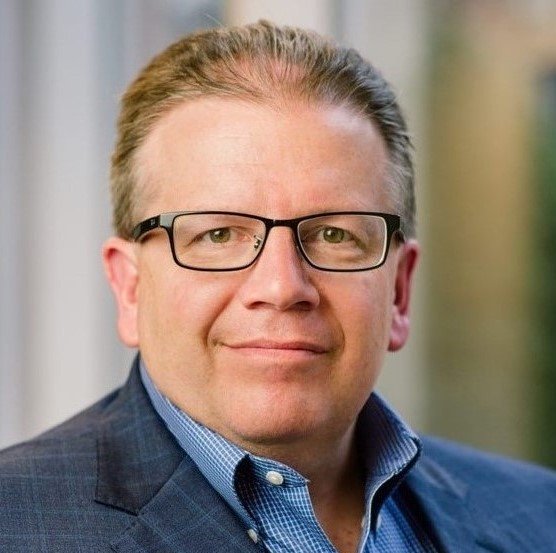

Speaker:
Bruce Bent II, Landing Rock Cash Management
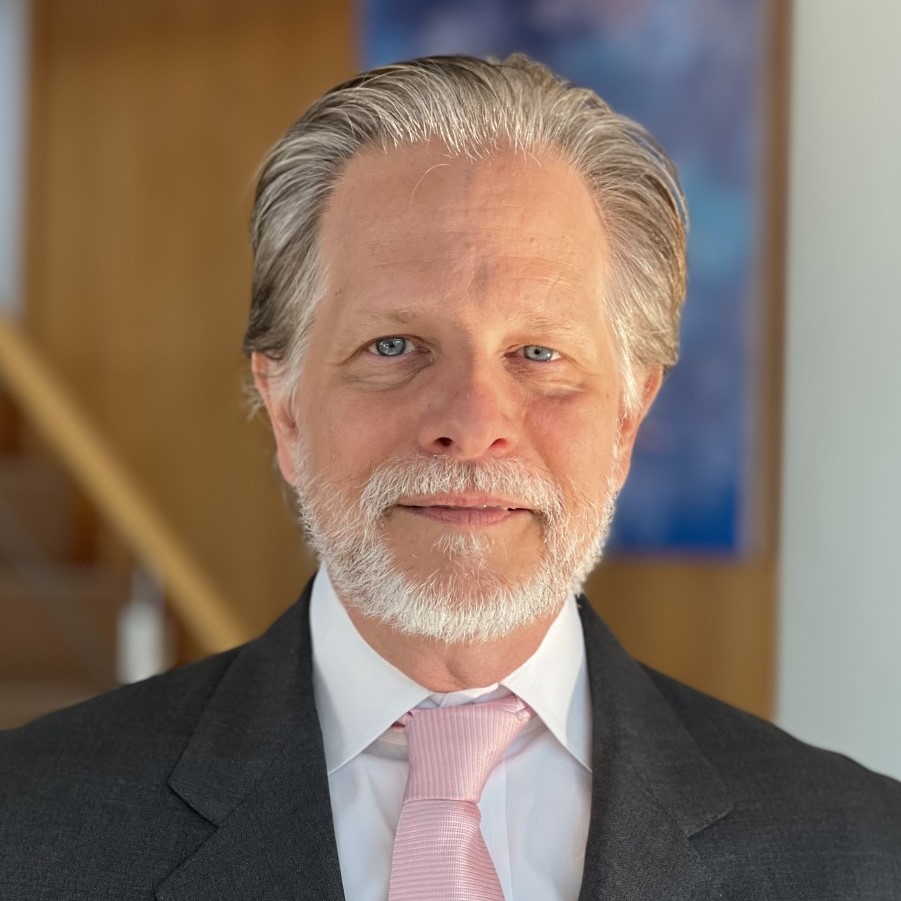

Episode Transcription - Episode 186 - Insured Deposit Accounts: Interest Rate Changes and Security
INTRO 0:04
Welcome to The Treasury Update Podcast presented by Strategic Treasurer, your source for interesting treasury news, analysis, and insights in your car at the gym, or wherever you decide to tune in. On this episode of the podcast host Craig Jeffery continues a conversation with Bruce Bent II, CEO and President of Landing Rock Cash Management, on insured deposit accounts with a focus on interest rate changes and security. They explore the differences between holding a certificate of deposit and having an individual development account, how to navigate investment decisions between products, and what you must consider with short term investment on security and compliance. Listen into the discussion to find out more.
Craig Jeffery 0:55
Bruce, welcome back to The Treasury Update Podcast.
Bruce Bent II 0:58
Thank you.
Craig Jeffery 0:59
Last time we discussed and had you give us a primer on insured deposit accounts and CDs. And I’d refer everybody to the show notes where you can look and listen to the prior podcast where you can hear a bit of Bruce Bent II’s professional background a little bit about the company Landing Rock. There’s some information there you can use to get familiar with him and the company. But as we start this talk, this discussion of interest rate changes and security in the context of insured deposit accounts. Maybe you could give us a quick review a very brief primer, an explanation of what an IDA is, just for those that are only listening to this podcast.
Bruce Bent II 1:50
Insured deposit account allows a customer to put cash into one account have it distributed amongst multiple banks without having to deal with the hassle of each one of those banks separately. It also gives them daily liquidity, typically, not always, but typically, and it should give them a competitive interest rate. As an example, they could open up one account with the company like Landing Rock put in a billion dollars, the company would spread that million dollars at $250,000 a piece across four banks, thus providing the million dollars of federal insurance coverage.
Craig Jeffery 2:33
Great, thanks, Bruce. Now, I did want to move into the key elements of the discussion of interest rates and security. So, interest rate changes, interest rates have been exceedingly low for a long period of time. So, what’s happening with interest rates? And how is this impacting current activities and short-term investing or expected activity so what’s going on with interest rates?
Bruce Bent II 2:56
The appearance of COVID-19 really gave a wall up to the economy as everybody knows and has experienced firsthand in one way, shape, or form. The Federal Reserve tried to help the economy recover from COVID by continuing to lower interest rates over the past few years. So, they lowered the fed funds target, now down to basically 0% to 0.25%. This is an attempt to stimulate the economy. Everybody can argue about whether or not that had any effect. Opinions vary, at this point over the past week the Federal Reserve has just started talking about starting to raise interest rates again. And their view has become what everybody refers to as hawkish, which is a reference to inflation, that they don’t want inflation to get out of control. We’re already seeing some inflation. And so, they are now proposing predicting three interest rate hikes in 2022 of a quarter of a point apiece with the first one starting in March. There is no guarantee that they’re going to do that, there’s no guarantee of anything really, but that’s what they’re signaling at this point.
Craig Jeffery 4:36
The general expectation is that there’s going to be an increase in how does that impact and how do you expect that to impact the shorter-term investment process? Is that going to lead people to more bonds, money market mutual funds, insured deposit accounts, what do you see happening from that?
Bruce Bent II 4:59
And the answer there is it depends on the needs of each underlying customer and what their options are. So, for example, most of the customers of Landing Rock, at least the pocket of funds that we see is the cash, and typically if a company or city or a town or a foundation or endowment of a college or university, they have a pocket of cash, and the options are cash management investments. Meaning they’re not in a position where they can say well, we’ve got $25 million dollars in cash, but stock market looks really good, so why don’t we just plop it in there for the next six months and see if we can take advantage of it. That’s typically not how they look at their investments, whatever is allocated to cash, then has options in the cash management realm. And then we’re talking about insured deposit accounts, money market mutual funds, public pooled investments that look like money market mutual funds that are not direct CD investments, direct treasury bills, things like that. When interest rates start going up, after bottoming out, you will typically see money market mutual funds benefit from the increase first that their rates will the yields on money market mutual funds will start to grow first. Insured deposit accounts, certificates of deposit, and let’s call them bank instruments are gonna lag a little bit. They may lag only about 30 days, but they’re typically going to lag a little bit, so you ‘ll see money Market funds pop up and then 30 days later, that bank instrument interest rates will catch up and then and they’ll continue that catch up over the time that interest rates are rising.
Craig Jeffery 7:05
You know, onto the topic of security, you know, safety, security. Those are key concerns for every organization and maybe the treasury manager or the treasurer is looking at security, compliance, safety on short-term investments. What are their priorities as you see them? What are your customers saying? What are you looking at in the space about safety and one of them? We talked about FDIC insurance or federal insurance coverage that may be required, but that also may be an added level of comfort, but anything else on that and then can you cover some of the other security compliance elements that are a top issue?
Bruce Bent II 7:50
When we’re talking about security, we’re talking about a few different types of risk. And so the first one obviously, is your principal risk, your investment risk. Can you lose any money? And if we go back to the fact that money funds typically will be a little bit ahead of insured deposit products while we have a rising interest rate environment, money market mutual funds are not federally insured. So, there is value to the insurance as well and different types of customers, different types of investors place different types of value on that insurance. So, for example, a money market mutual fund might be ahead of insured deposit product by say 10 basis points in a 50 basis point fed funds rate environment, which would be significant, however, if you’re the CFO or treasurer at a school district, a city, a town, a college or university that might not be enough for you to say I want out of the insured deposit product into the money market mutual funds. It’s not going to compensate you for giving up the federal guarantee, basically, versus no guarantee in a money market mutual fund. On the other hand, if you’re a corporate treasurer, maybe they do what to take that risk maybe they ten basis points is enough compensation to come out, so guaranteed products into no guarantee product.
Craig Jeffery 9:50
So, a couple things on that, Bruce, this idea of there’s no insurance coverage on that, I guess the other part related to safety also has a feedback loop from liquidity, money market funds and IDAs both have daily liquidity. There are some triggers and mutual funds when you reach a certain level of withdrawals there are some triggers that can stop the flow or put a pause on it. Is there something similar on IDAs that would put a pause on withdrawing funds out of a certain level of withdrawal activity in particular fund for example.
Bruce Bent II 10:32
You’re referring to the new gates or recent new-ish gates that they put on money market mutual funds that they experience a run on the fund massive withdrawals. Yeah, there’s not there’s nothing there in banking land. However, there is a fundamental rule that all banks have which is they have seven days to give you your money back. They rarely exercise it and unless basically the bank is going to become insolvent. But for any of us, this is what the rule is, if you walked into Chase Bank where you have a checking account and try to take out some money today, they could tell you, well you know what, we’ll give it to you in seven days because we have that right, they have that right. Banks don’t exercise it because it’s not, you know, it’s not good business to exercise it. So, but that was the only thing they’re.
Craig Jeffery 11:30
All the other banks wouldn’t do that, right? On the security and safety side there’s the counterparty or instrument exposure because you have the federal government or FDIC insurance stand behind it eliminate some of that, in terms of compliance. You know, you work with a number of different companies, institutions, foundations, universities, what goes on with policy limitations that people consider from a security and compliance perspective with their short-term investments.
Bruce Bent II 12:02
From the customer standpoint, it or the investor standpoint, it varies, right, so one extreme is public funds. Let’s say you have the Transportation Authority in some major city, they already have a whole bunch of processes and procedures and approvals and consultants and advisors. I mean, they’ve got everything in there because it’s other people, it’s public money. And so, they’re extremely conservative. They have investment guidelines that first tells them what they can and cannot do with the funds with the cash and oftentimes it will require it to be fully federally insured, and then the process of them making an investment if it’s a new investment in a new company like a product like Landing Rock would offer or competitors Landing Rock would offer. They have to put together a whole package for the board, have to have their Board approve the investment. They have to have their investment advisor opine on it and approve it if they have consultants they also and then they also have to adhere to whatever regulations or laws there are for their state or their county or their city.
Craig Jeffery 13:33
So, let’s say I am the treasurer of a major corporation. We have we have relationships with TD Bank, Wells Fargo, Synovus, JPMorgan Chase, we already have a balance there. We want to use an IDA. We’ve got 20 million we want to put in there. But the reason we want to put that much in there we want that protected and safe now, if you buy from TD Bank, Synovus, JP Morgan, Wells, we’re not going to have insurance coverage on the same tax IDs, are we? If you invest if you distribute the money through the is that the case? And if so, is there a way of avoiding that? Doubling up and eliminating the actual protection that we sought?
Bruce Bent II 14:25
For insured deposit accounts they offer the ability for the customer to deselect banks from the network so that when you open an account an insured deposit account or something similar, you will see the list of potential banks that your money will go to and you have the ability to check the box on Wells Fargo and whatever else wherever you already have money and say do not put any of my cash in these banks because I already have a savings account, checking account, operating account, I already own CDs there. Does that will avoid the possibility of having more than $250,000 in any one bank through the insured deposit account. And this will be in the terms and conditions of these types of accounts that should probably be by Landing Rock or anybody else. They will have a document called terms and conditions and it will explain to you in the document how you can do that.
Craig Jeffery 15:39
The concept of IDAs or insured deposit accounts. If you were to answer this and this is sort of the final thought question. What about insured deposit accounts are most often misunderstood? What’s the biggest issue that you find you have to address and say that’s not that’s not really, right? What’s the what’s the biggest one or two?
Bruce Bent II 16:01
I guess one is that it sometimes they’re confused with similar products where there’s some other products out there where the customer opens up an account with the product provider. And then a provided product provider opens up separate accounts for the customer. So, it looks like on the face of it that you’re going to have one account. But then the next thing that happens is you end up getting three four or five statements emailed to or mailed to you and you’re also bombarded with email solicitations from these three, four, or five banks that the company opened the account with is dealing with. Our customers sometimes want to make sure that there really is just one account with the insured deposit account and Landing Rock. They’re not going to be bombarded with information directly from all the underlying banks that we deal with. So, that’s one thing that we have to clarify sometimes. after that. I think what comes up more often than not is people expect it to be a lot harder than it is. We get basic questions like okay; I want to wire in some money. I want to wire out some money. I want to I want to look at my statement. I want to share the statement with my board, we have a meeting coming up. How do I download this information? And they think it’s going to be complicated because we’re dealing with hundreds of banks across the country and we’re dealing with very large sums of money. And the answer is usually, you know, click here for this, click here for that on the account. And it’s very, very simple. That’s not completely unique to us. Because I’m a proponent of these types of products in general. It’s a lot simpler than most people think.
Craig Jeffery 18:00
Excellent. Thanks so much for your time talking about the interest rate changes, short term investing, as well as security with regard to insured deposit accounts. Thanks again.
Bruce Bent II 18:11
Thanks for having me.
OUTRO 18:15
You’ve reached the end of another episode of The Treasury Update podcast. Be sure to follow Strategic Treasurer on LinkedIn, just search for Strategic Treasurer. This podcast is provided for informational purposes only, and statements made by Strategic Treasurer LLC on this podcast, are not intended as legal, business, consulting, or tax advice. For more information, visit and bookmark strategictreasurer.com.
Related Resources
#TreasuryFAQ – YouTube Playlist
Check out our YouTube playlist covering many frequently asked questions in treasury!
Primer: Insured Deposit Accounts
Host Craig Jeffery sits down with Bruce Bent II, CEO and President of Landing Rock Cash Management, to discuss a primer on insured deposit accounts. They share foundational knowledge around CDs and insured deposit accounts, short-term investment options, federally insured cash management accounts, and more.


